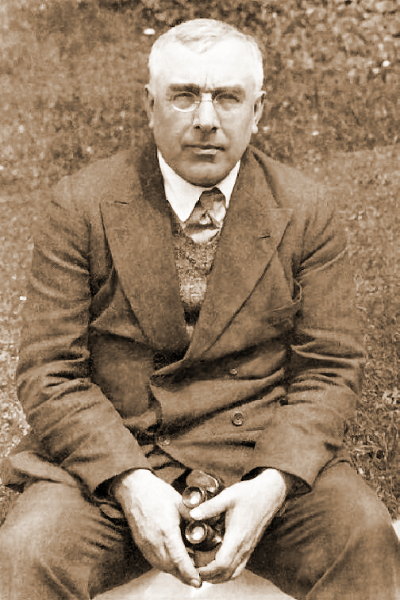P D Ouspensky
 5 March 1878 – October 1947
5 March 1878 – October 1947
Peter Ouspensky was born to parents who were part of Russia’s educated elite. He worked as a journalist in Moscow and St. Petersburg, and he also wrote and self-published a number of books. He was well-known prior to encountering Gurdjieff, by virtue of his book Tertium Organum: The Third Canon of Thought, a Key to the Enigmas of the World, which he published in 1912.
He toured the East searching fruitlessly for esoteric schools, failing to encounter one until he met with Gurdjieff in Moscow in 1915. He became a member of Gurdjieff’s St Petersburg group which also included Dr. Leonid Stjoernval, Andrei Zaharoff, Anthony Charkovsky, Nicholas R–, and Anna Ilinishna Butkovsky. Meetings were held almost every evening. In February 1917 Thomas and Olga de Hartmann joined the group and Sophia Grigorievna Savitsky, who became known as “Mme Ouspensky.”
That same month civil disorder broke out in Russia and Gurdjieff left for the Caucasus. Osupensky’s relationship with Gurdjieff was difficult; he left Gurdjieff first in Essentuki the summer of 1919 and then again in Constantinople in August 1921 when he immigrated to England setting up a group near London. Ouspensky was well received in London and was given a meeting place in Lady Rothermere’s studio.
In January 1924, Ouspensky broke for good with Gurdjieff and started his own line of teaching. The notes of the lectures he gave and the Q&A at the lectures and at meetings is documented in three books: The Fourth Way, A Further Record and Psychological Lectures 1934-1940
In 1941, because of the Second World War, he left for New York where he again formed groups. In late 1942 an estate in Mendham, New Jersey, called Franklin Farms, was purchased for Ouspensky to use as a center for his activities. Mme Ouspensky, suffering from Parkinson’s disease, spent much of her time in bed but continued to direct Work activities.
Ouspensky returned to England in 1947 and held a series of talks in which he, reportedly, disassociated himself from what he had taught. He ceased group meetings, but continued to see a small circle of his intimates, which included Lord Pentland and Rodney Collin-Smith. He became ill with kidney disease but refused to seek treatment. He died on October 2, 1947.